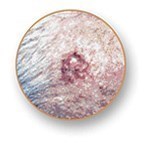FAQs
Am I at risk of developing cSCC?
People with all skin tones can develop cSCC, but those with lighter skin who spend lots of time in the sun, use or have used tanning beds, and take medications to prevent organ transplant rejection are at a higher risk.1
How does cutaneous squamous cell carcinoma differ from other skin cancers in appearance?
Not all cSCCs look the same. They can present as scaly red patches, open sores, rough, thickened or wart-like skin, or raised growths with a central depression. Basal cell carcinomas may appear as a flesh-colored, pearl-like bump, or a pinkish patch of skin. Melanoma often develops within an existing mole or suddenly emerges as a new dark spot on the skin.2

Basal Cell Carcinoma2

Squamous Cell Carcinoma2

Melanoma2
I am at risk of developing cutaneous squamous cell carcinoma. What early signs should I look out for?
cSCC may develop from a precancerous growth called actinic keratoses, which manifest as dry, scaly patches or spots.2

Actinic keratoses2
How can I prevent cSCC?
The best way to prevent cSCC is by minimizing exposure to UV rays. When you’re outdoors, seek shade and use sun protection like clothing, sunglasses, and sunscreen. Avoid tanning beds, sun lamps, and harmful chemicals. Regularly check your skin for any new growths or abnormal areas, and steer clear of tobacco. Whenever feasible, avoid weakening your immune system.3
What are tests for cSCC?
As a first step, your doctor will conduct a physical exam and inquire about your symptoms, medical history, and any unusual skin marks. The doctor will carefully observe the shape, size, color, and texture of any questionable spots. If the doctor suspects the spot to be cancerous, a portion of it will be removed and sent to a lab for analysis, which is known as a biopsy. If a lymph node appears abnormal, a lymph node biopsy may also be performed. Additionally, imaging tests like MRI or CT scans may be ordered if there is concern about the cancer spreading beyond the skin.4
Can cSCC be cured?
Early-stage cSCCs can be successfully treated with local treatments such as surgery or radiation therapy, leading to a potential cure. Larger cSCCs and fast-growing cancers are more challenging to treat and have a higher risk of recurrence.5
Is cSCC contagious?
No1
How dangerous is cSCC?
Squamous cell skin cancer usually grows slowly and is not life-threatening. However, in those with a compromised immune system, such as from organ transplant medications or leukemia, it can grow more aggressively. If untreated, it can penetrate deeply, damaging nerves, blood vessels, and spreading to other body parts, which can be deadly. Early detection is crucial for effective treatment, as it prevents deep growth and complications.1
Questions to ask my healthcare provider
- Can my cancer be cured with surgery alone, or do I need systemic therapy?
- What are my treatment options?
- Is a clinical trial an option for me?
- Do you follow the NCCN recommendations for treatment?
- What if I am pregnant, or planning to become pregnant?
- Does any option offer a cure or long-term cancer control?
- How long do I have to decide about treatment?
- How long will treatment last?
- What supportive care and services are available to me and my caregivers?
- What are the chances of the cancer worsening or returning?
References
- American Academy of Dermatology Association. Skin Cancer Types: Squamous Cell Carcinoma Overview. Last updated April 28, 2023. (https://www.aad.org/public/diseases/skin-cancer/types/common/scc).
- American Academy of Dermatology Association. Types of Skin Cancer. (https://www.aad.org/public/diseases/skin-cancer/types/common).
- American Cancer Society. Can Basal And Squamous Cell Skin Cancers Be Prevented? Last Revised: October 31, 2023. (https://www.cancer.org/cancer/types/basal-and-squamous-cell-skin-cancer/causes-risks-prevention/prevention.html).
- American Cancer Society. Tests For Basal And Squamous Cell Skin Cancers. Last Revised: October 31, 2025. (https://www.cancer.org/cancer/types/basal-and-squamous-cell-skin-cancer/detection-diagnosis-staging/how-diagnosed.html).
- American Cancer Society. Treating Squamous Cell Carcinoma Of The Skin. Last Revised: October 31, 2023. (https://www.cancer.org/cancer/types/basal-and-squamous-cell-skin-cancer/treating/squamousl-cell-carcinoma.html).

